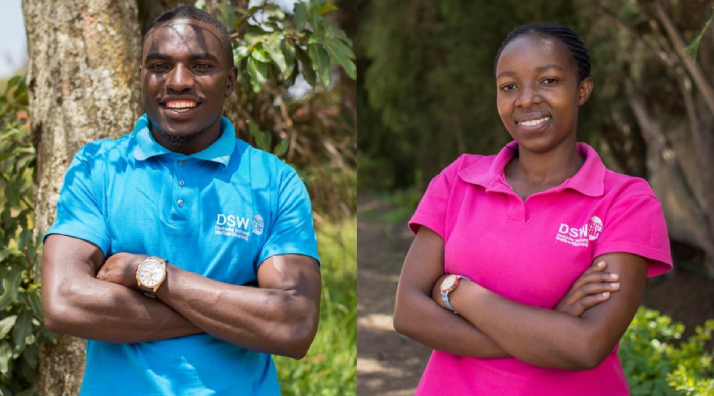Youth Champions leading change for young people in Kenya

Eight DSW Youth Champions will be using their voices this year to make sure the EU’s external action effectively responds to young people’s needs, particularly in the field of global health and sexual and reproductive health and rights. The Youth Champions are from Kenya, Uganda, Ethiopia, and Tanzania and are an integral part of DSW programmes in their countries and communities; empowering young people and promoting their rights.
We first heard from Jessy and Dorothy from Uganda. Next up, we have Burnice and Kevin, two DSW Youth Champions from Kenya. Let’s hear from them why they decided to become youth champions, and what change they’re wanting to create to address the challenges youth in their communities face.
Kevin Owala is a 23-year-old youth champion from Trans Nzoia County in Kenya.
Kevin is passionate about creating awareness around sexual and reproductive health and rights among young people in his community and using his voice to advocate for youth friendly sexual and reproductive health services and provisions. More in this video:
Burnice Waringa is a 24-year-old youth champion from Nyandarua County in Kenya.
Burnice wants to empower all young people to be the change they want to see – using her voice to call on decision makers to prioritise youth and create a brighter future for her and her peers. More in this video:
What challenges are young people in Kenya facing?
Burnice says, “In my sub-county, youth (15 – 24yrs) form approximately a quarter of the entire population. This presents great economic and social opportunities but also enormous challenges, including high unemployment rates, early and unplanned pregnancies, high HIV and sexually transmitted infection rates, and sexual and gender based violence.
Young people face challenges in accessing opportunities that allow them to achieve their potential. There is poor access to economic opportunities due to a lack of adequate employability skills, poor training, access to capital, and linkage to markets.
Deep-rooted myths and misconceptions about sexual and reproductive health services are widespread, with young people as a result facing many barriers to obtaining such services. This is compounded by the lack of youth-friendly services that are available – this really needs to change!”
Kevin adds, “Young people worry about going to health facilities because of fear of judgment from the service providers who are nearly their parents’ age, so they are not free to tell them their issues and are discouraged from seeking out services. This has led to a rise in teenage pregnancy and sexually transmitted infections among other challenges.
Teenage pregnancy in particular is a serious issue and needs urgent action to reduce the rate which has been growing at an alarming rate. It worries me a lot because it leads to poverty in our community, rape, gender-based violence, stigmatisation, and school dropout – meaning girls lose out on their education, meaning they are unable to progress into their desired careers.”
What needs to change?
Young people must be informed about their sexual and reproductive health and rights, that’s why we are asking the government and civil society organisations to make sure that there is comprehensive sexual education for young people through community sensitisation and awareness-raising.
We have been calling for more youth corners and youth service providers in those facilities, but there is still inadequate capacity among service providers, especially in the provision of youth-friendly services, in part because key decision-makers at the county level lack the capacity to plan, budget and implement key services for youth.
Insufficient data on youth accessing various health and economic empowerment services makes monitoring a challenge, so better data gathering is really important to measure challenges and successes, and to progress.
What role for the European Union?
Burnice and Kevin recently met with EU decision-makers and shared their recommendations as to how the EU can support young people in Kenya to tackle the challenges they’re facing. They include:
– The EU could strengthen its partnership with the Kenyan government at all levels, to make sure sexual and reproductive health and rights are prioritised. This could be achieved by providing sexual and reproductive health training, improving life skills, and strengthening the provision of youth-friendly services, for example through the integration of youth-friendly corners and services into health facilities.
– The digital transformation that Kenya is witnessing represents a great opportunity to tackle the challenges that youth face in the area of sexual and reproductive health and rights. The EU should support the Kenyan government in strengthening the digital transformation and making sure that digital tools can effectively address young people’s sexual and reproductive health and rights needs.
– The EU should design programmes that will increase socio-economic opportunities for young people by improving youth employability, by providing them with relevant skills, training on entrepreneurship and business management, providing linkages to market and business capital.
– The EU could also allocate specific and more funding to local community-based, youth, and grassroots organisations to be able to empower more youths on matters of sexual and reproductive health information.
– We call on the EU to upscale its engagement with young people, youth groups, civil society organisations, especially those focused on sexual and reproductive health and rights, specifically family planning. We hope that the EU will listen more and more to the voices of young people and take them into account.





